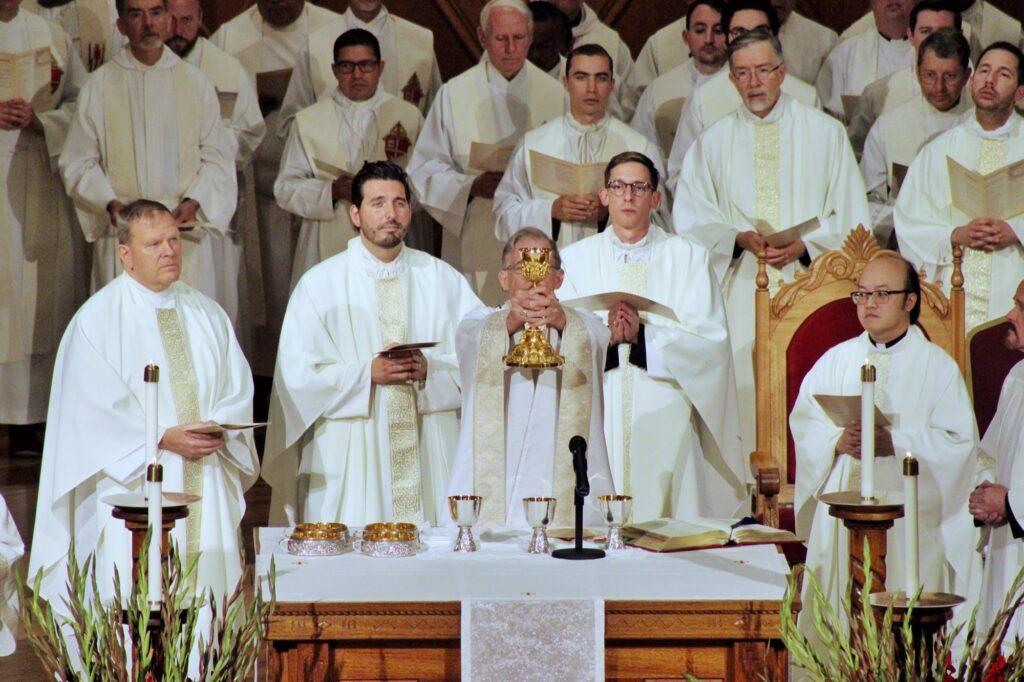Get Started.
What is a Vocation?
Vocation comes from the Latin word “vocare” which means “to call”.
Every baptized Christian is called by God to be holy; living a life of prayer, service, and virtue, growing closer to God and walking humbly with Him. Each Catholic then responds to God’s personal invitation to live out that call to holiness through a particular state of life, whether in marriage, priesthood, religious life, or single life.
Why discern God's call?
You will never regret having taken your vocational discernment seriously. “For freedom Christ set us free” (Gal 5:1). But freedom for what? If you are doing what God calls, you will find freedom, fulfillment and peace in living out your calling–not necessarily a comfortable way of life.
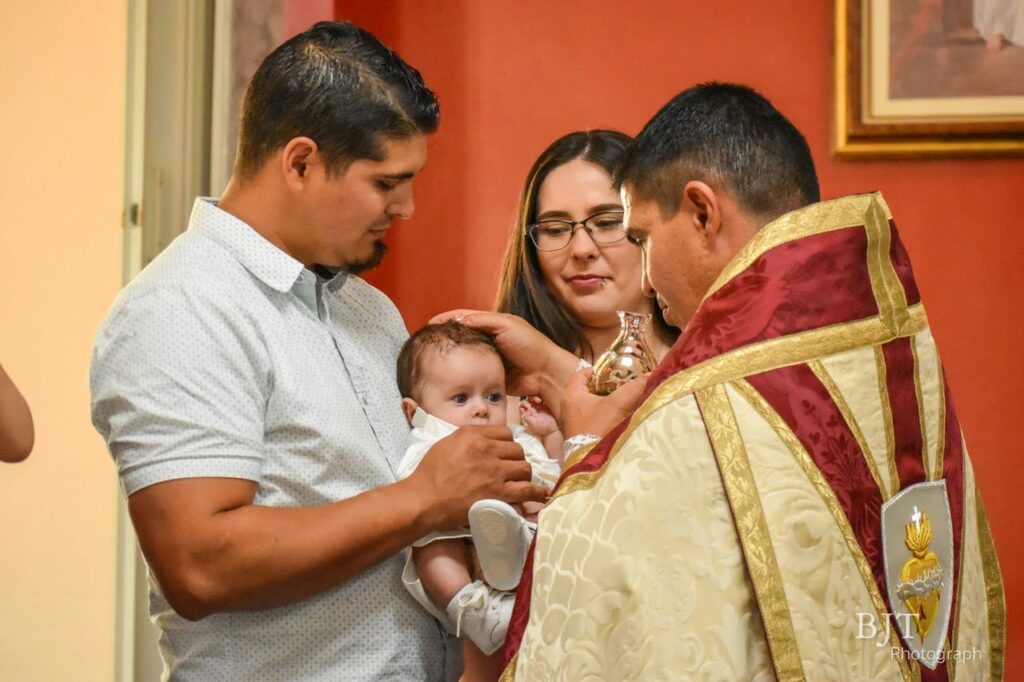
- Pope Benedict XVI
Prayer.
- Prayer for Vocations using this Prayer for Vocations
- Pray these Nine Holy Hours to help with your discernment
- Pray the Rosary for Vocations
Resources.
- Check out these Resources from the USCCB
- Consider a Pilgrimage with Pilgrimages for Vocations
- Receive a regular discernment newsletter from the Vocations Office
Fr. Adrian’s Book List for Discerners.
Discerning the Will of God
Fr. Timothy Gallagher
Discernment Do’s and Don’ts
Fr. George Elliott
To Save a Thousand Souls: A Guide for Discerning a Vocation to Diocesan Priesthood
Fr. Brett Brannen
Request your free copy from our vocations office
Discernment 180 for Men by Fr. Greg Gerhart
Is Jesus Calling You To Be A Catholic Priest? A Helpful Guide
Fr. Thomas Richter, published by the NCDVD
Priests for the Third Millennium
Archbishop Timothy Dolan
The Priest is Not His Own
Archbishop Fulton J. Sheen
Those Mysterious Priests
Archbishop Fulton J. Sheen
Christ the Ideal of the Priest
Bl. Abbot Marmion
The Joy of Priesthood
Msgr. Steve Rosetti
Reclaiming our Priestly Character
Fr. David Toups
The Grace of Ars
Fr. Frederick Miller
Gift & Mystery
Pope St. John Paul II
A Shepherd in Combat Boots: Chaplain Emil Kapaun of the 1st Cavalry Division
William L. Maher
The Shadow of His Wings: The True Story of Fr. Gereon Goldmann, OFM
Gereon Karl Goldmann
The Priest in Union with Christ
Rev. Reginald Garrigou-Lagrange (Author)
“…And You are Christ’s” The Charism of Virginity and the Celibate Life
Thomas Dubay, S.M.
Why Celibacy?
Fr. Carter Griffin
The Courage to be Chaste
Fr. Benedict Groeschel
When God Asks for an Undivided Heart
Fr. Andrew Apostoli
Virginity
Fr. Raniero Cantalamessa
Introduction to the Devout Life
Francis de Sales
A brief Reader on the Virtues of the Human Heart
Josef Pieper
He leadeth Me
Fr. Walter Ciszek, S.J.
Captivating
John Eldredge
Wild at Heart
John Eldredge
Fathered by God
John Eldredge
Discerning Religious Life
Mother Clare Matthiass, CFR
A Living Sacrifice
Fr. Benedict Croel, O.P. and Fr. Andrew Hofer, O.P.
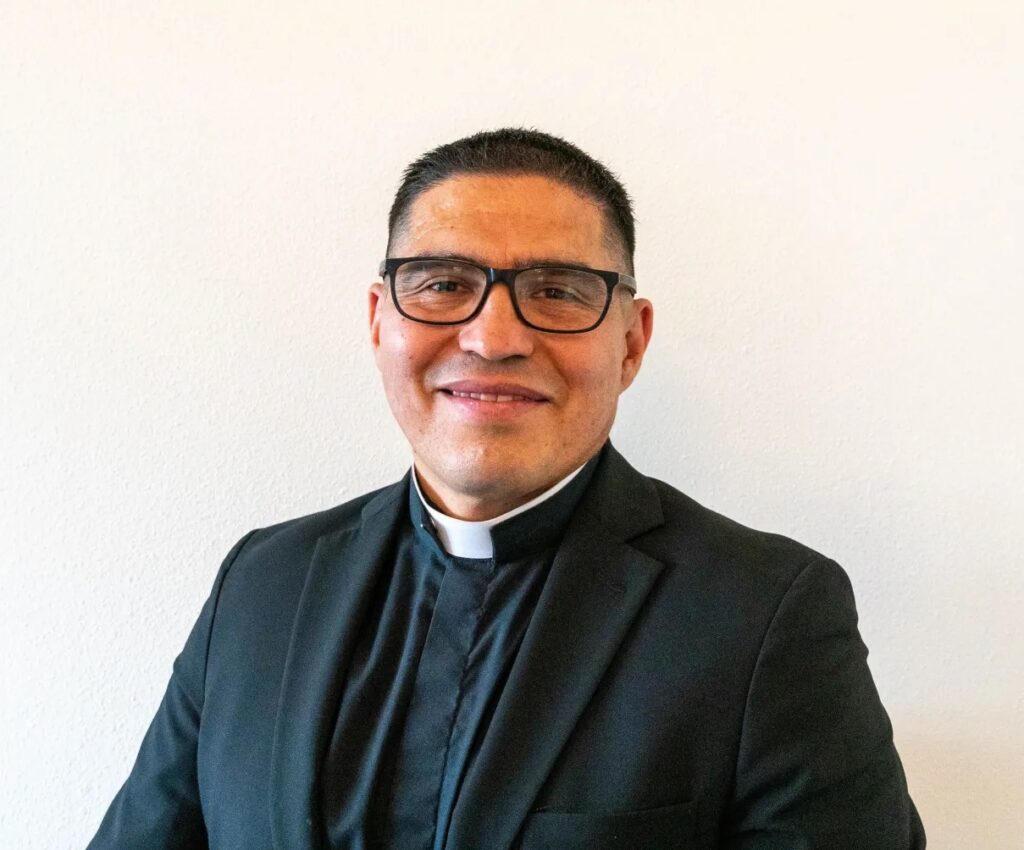
What is Priesthood?
A priest is an “Alter Christus” or, “Another Christ”.
Men that Christ calls to be His priests are ordained to the ministerial priesthood after a mutual process of discernment and formation with the Church through the Sacrament of Holy Orders. They promise to receive and exercise the beautiful gift of celibacy as a powerful means of generating spiritual life to God’s children.
Why diocesan Priesthood?
You will never regret having taken your vocational discernment seriously. “For freedom Christ set us free” (Gal 5:1). But freedom for what? If you are doing what God calls, you will find freedom, fulfillment and peace in living out your calling–not necessarily a comfortable way of life.
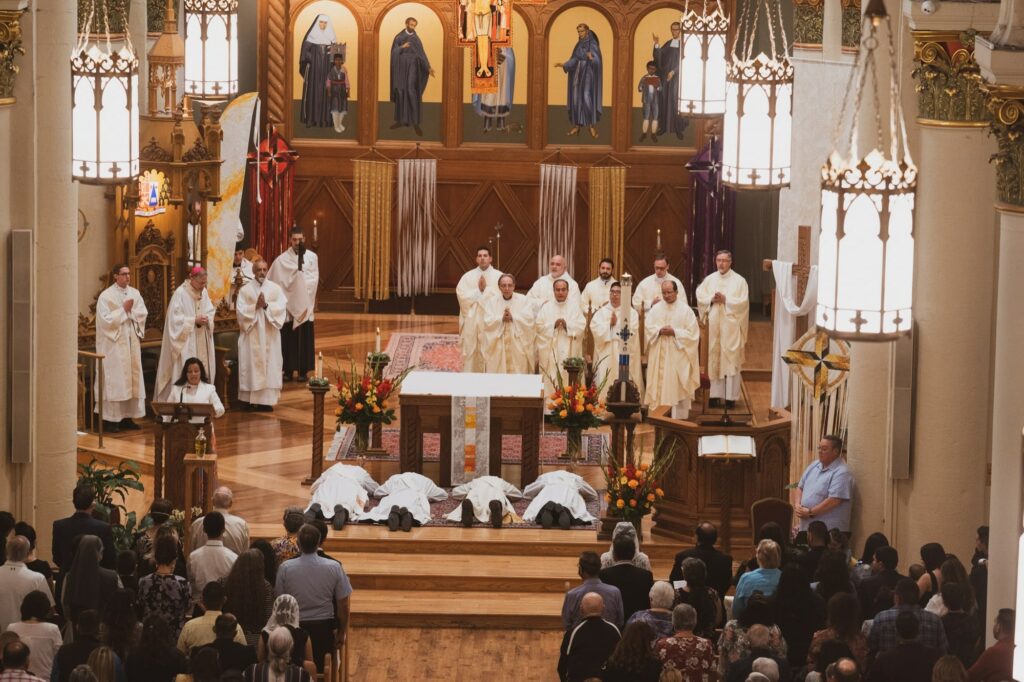
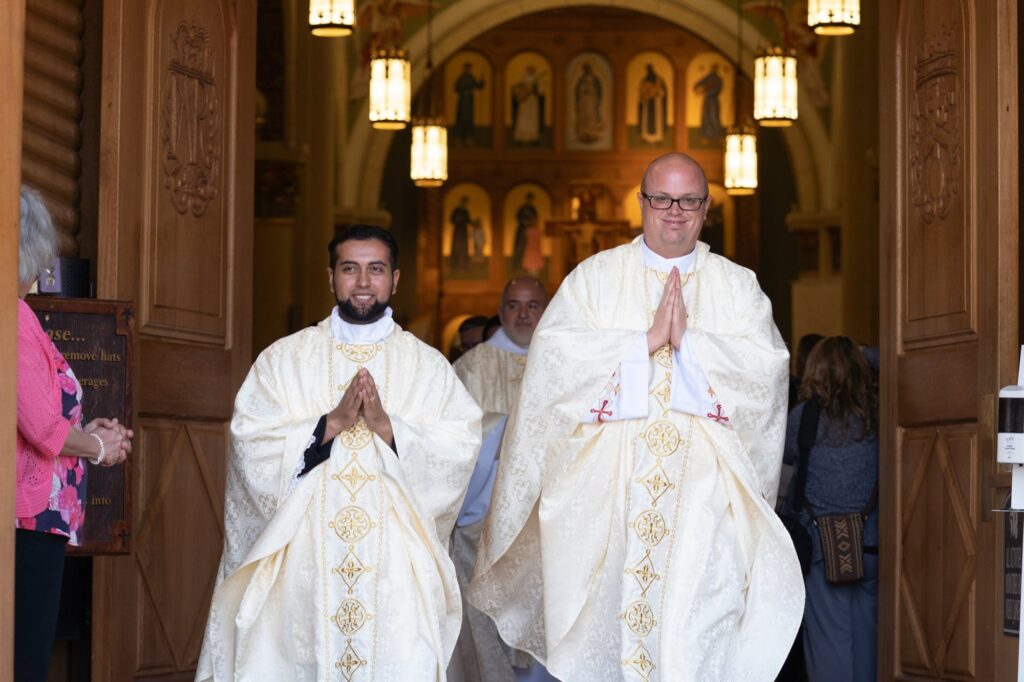
What does it look like?
In union with their local bishop, priests generate life by sharing in the threefold office of Christ who is priest, prophet, and king.
They do this to sanctify, teach, and govern the People of God. This involves a multifaceted role of spiritual leadership, pastoral care, and community engagement. Priests serve as shepherds of their parishes, guiding and nurturing their congregations in faith. They celebrate Mass, administer the sacraments, and provide spiritual guidance and counseling to parishioners. Additionally, priests do their part to address the diverse needs of their local communities.
- St. John Paul II
FAQ
As you begin or continue your discernment, you may find you have questions like the ones below. Remember that everyone’s situation is unique, and we want to reiterate: you don’t have to have it all figured out before you reach out to the Office of Vocations.
Celibacy is not unnatural; rather, it is a supernatural calling from God. If God calls and you have the appropriate disposition and nature to receive that call, He will help you along the way. Celibacy allows the priest to remain unmarried, so as to give his life freely and full-time to the building of the Kingdom of God. It is a great gift, that at this point you need to have the desire for, but it’s okay if you have some anxiety surrounding how you’ll be able to do this. God can accomplish much more than we think we are capable of when we surrender to Him.
As St. Thomas Aquinas wrote, “Grace builds on nature”. A natural desire for fatherhood actually makes you even more qualified for the priesthood. All men are called to spiritual fatherhood in one way or another. Some are called to be spiritual fathers through biological fatherhood. Others are called to be spiritual fathers through the ministerial priesthood without having biological children. And some men are invited into spiritual fatherhood by giving life to others through the vocation of the holy single life or as a religious brother. So, this beautiful desire that God has given you can be fulfilled in each state of life, in a variety of ways. If you live out this desire through your proper calling, you can and will find true joy.
Appropriate emotional intimacy with others is essential for a priest to be able to maintain. That means for a young man who is discerning priesthood, working on having close relationships with others is a very important aspect of his formation. Emotional intimacy does NOT mean sexual intimacy or emotional dependency, and proper boundaries in these relationships are what make them healthy and supportive. Solid friendships with both men (other priests and single or married men alike) and women are what continue to sustain a priest throughout his life-long ministry. We want to see evidence that you are capable of this and desire it as you enter seminary.
If you are currently in a relationship but thinking about the seminary, that’s okay. However, at some point you’ll need to discern whether taking a break from dating is a step that is necessary to help determine whether or not the call to seminary is strong enough to pursue fully. Dating helps you to affirm a calling to marry a particular person after discerning a call to marriage, in the same way that going to seminary or entering the first year of formation would help you affirm a call to the priesthood. We may recommend a respite period prior to entering seminary if you were in a relationship within the few years prior to contacting the Vocations Office.
If you feel called to enter now, but as you go through your formation in seminary that call is clarified and you realize that you are no longer called, thank God for that! Most men who have entered seminary and left can attest that their time in the seminary formed and prepared their hearts for the gift of their ultimate vocation. And also that it served to strengthen their primary vocation to holiness.
Getting the right help from a qualified counselor to improve your mental health is an important step on the journey of whole-person healing. You should continue seeing your counselor as long as they recommend. Seeing a counselor does not disqualify you from entering the seminary. You will undergo psychological testing to help your formators better understand how you function. It will also help determine the seriousness of your needs, and whether it is appropriate for you to discern the priesthood at the same time as you undergo counseling. Again, this is an individualized decision and one that would be made down the line of your discernment, with proper transparency involved.
The priesthood can be physically taxing and it is important that we are aware of any health concerns from the beginning. Sometimes health concerns can be an impediment to ordination, but not always. This would all be part of our conversation before admitting a man to seminary.
Yes, we do require a thorough background check as part of the application process. We expect that applicants are seeking to live a moral life and we would discuss any discrepancies at an individual level. If there’s something that would be of concern, we would invite you to be transparent early on.
Holiness is everyone’s universal vocation, and it is a lifelong journey. There is no expectation that you would reach a level of holiness before entering seminary or by the time you are ordained. Your time in seminary is called formation, which will give you tools to help you grow closer to Christ throughout your life as a priest. For now, continue to pray daily and receive the sacraments of penance and the Eucharist regularly.
Praise God! God is deeply at work in your soul. Sometimes conversion spurs a deep desire to give one’s whole life to Christ in the vocation of priesthood. But we encourage you to take some time after your initiation into the Faith to let God’s life breathe in you, and to get used to life as a Catholic. The recommended time is 2 years to wait, but every situation is different.
We can work with you in each situation, if your call is authentic. The priesthood does involve schooling and intellectual formation. It is important that you can nourish both well-educated and under-educated people in your ministry, and do so respectably. However, if you have a true desire to learn and grow in this realm, becoming a priest is not out of the question. Trust that God will provide!
What is Religious Life?
God calls some men or women to profess vows promising to keep the evangelical counsels of poverty, chastity, and obedience. They live in a community with other brothers or sisters and follow the charism and rule of their particular founder.
Men called to be priests within the context of religious life usually make these vows first, before they receive Holy Orders.
Why Religious Life?
Religious life brings together men or women under the same founder who share the same charism and are dedicated to the same mission. The apostolates of each order vary according to their mission. Some orders are dedicated to a life of prayer–these are contemplative communities. Other orders are considered active if they combine prayer and apostolic work.
